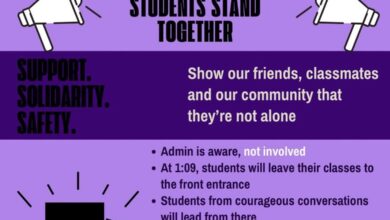For some, eating disorders can start with the echoes of a single comment
For one BHS student, a yearslong struggle started with a piece of advice from a childhood coach

Mary Jane ‘23* sits in her bed punching her pillow because she can’t cry. She’s upset at herself. She’s upset with herself because she ate too much, or not enough, or both. It’s a pain that invades almost every aspect of her daily life and it started years ago.
Jane’s eating disorder started when she was a child in youth gymnastics, when a coach told her to skip meals. Something that sounds so innocent to help people get better at gymnastics ended up being life-threatening words to Jane.
“When my coaches started telling me to stop eating,” Jane said, “to only drink smoothies, to only do this and that, it felt normal to me, and I didnt know it wasn’t.”
Eventually Jane realized this wasn’t as normal as she thought, which led her to make a decision to go to treatment just to realize treatment wasn’t going to solve all of her problems.
“I thought it was going to be done and over with,” Jane said, “but I didn’t even think I had an eating disorder to begin with, but when I started going to treatment I was like, ‘Oh, it’s going to be fine’, and then it just kept getting harder.”
Even after treatment and everything Jane went through it still changed her life and her family’s life as well.
“Well, they definitely don’t trust me making my own food like they have to make it,” Jane said, “and I can’t go to the bathroom without someone just standing outside my door to be sure I don’t throw up. It definitely makes everything so awkward when I say I’m not hungry and they’re like. Do we need to talk to your therapist?”
Jane said that, even though she’s lost some trust and things aren’t always sunshine and rainbows at Jane’s house – or in her mind – she’s found positives in the experience.
“Obviously I wish I didn’t have one or I wish I didn’t go through so much drama,” Jane said, “but I feel like it’s made me like a more mature person.”
Jane isn’t the only person who deals with having a rough relationship with food. According to the National Institute of Mental Health, 2.7% of teens have an eating disorder, and that number is higher in girls than in boys. However, a recent Harvard study said that that number may have “skyrocketed” during the COVID-19 pandemic. NEDA ( National Eating Disorder Association ) have a hotline for messaging calling and texting. Their number is 800-931-2237.
*Mary Jane is a student at BHS whose name has been changed due to the sensitive nature of her story.





